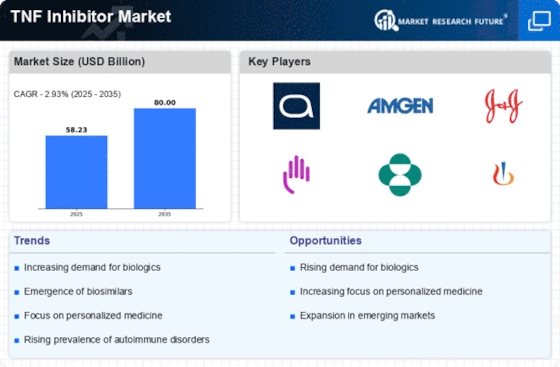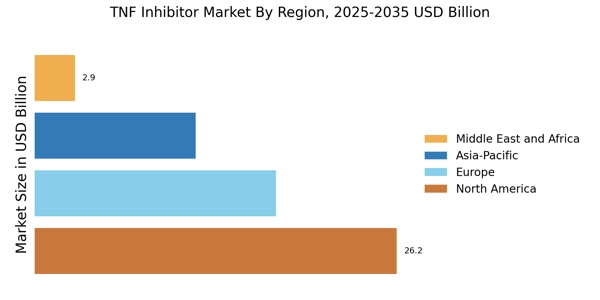Advancements in Biologics
The TNF Inhibitor Market is experiencing substantial growth due to advancements in biologics. These innovative therapies, derived from living organisms, have shown remarkable efficacy in treating various inflammatory conditions. The development of new biologic agents, including monoclonal antibodies and fusion proteins, has expanded the therapeutic landscape for patients. Market data suggests that the biologics segment is projected to grow at a compound annual growth rate (CAGR) of over 10% in the coming years. This growth is driven by the increasing approval of new TNF inhibitors and the ongoing research into their mechanisms of action. As more biologics enter the market, the TNF Inhibitor Market is likely to witness heightened competition and improved treatment options for patients.
Regulatory Approvals and Market Access
Regulatory approvals play a pivotal role in shaping the TNF Inhibitor Market. The streamlined approval processes for new drugs, particularly in regions with stringent regulatory frameworks, have facilitated quicker market access for TNF inhibitors. Recent trends indicate that regulatory agencies are increasingly prioritizing the review of innovative therapies, which could lead to faster approvals for new TNF inhibitors. This trend is likely to enhance the competitive landscape of the market, as companies strive to bring their products to market swiftly. Additionally, favorable reimbursement policies are further supporting market access, allowing patients to benefit from these therapies. Consequently, the TNF Inhibitor Market is poised for growth as more products gain regulatory approval and reach patients.
Growing Investment in Pharmaceutical R&D
Investment in pharmaceutical research and development is a crucial driver for the TNF Inhibitor Market. Pharmaceutical companies are allocating significant resources to discover and develop new TNF inhibitors, aiming to address unmet medical needs. The global pharmaceutical R&D expenditure has been on the rise, with estimates indicating that it could reach over 200 billion USD annually. This influx of funding is likely to accelerate the development of novel therapies and enhance the existing TNF inhibitor portfolio. Furthermore, collaborations between biotech firms and research institutions are fostering innovation in this field. As a result, the TNF Inhibitor Market is expected to benefit from a continuous stream of new products and improved treatment modalities.
Increasing Prevalence of Autoimmune Diseases
The rising incidence of autoimmune diseases such as rheumatoid arthritis, psoriasis, and inflammatory bowel disease is a primary driver of the TNF Inhibitor Market. As these conditions become more prevalent, the demand for effective treatment options escalates. According to recent estimates, autoimmune diseases affect millions of individuals, leading to a significant market opportunity for TNF inhibitors. The increasing awareness and diagnosis of these diseases further contribute to the growth of the market. Healthcare providers are increasingly prescribing TNF inhibitors as a first-line treatment, which is likely to enhance their market penetration. This trend indicates a robust growth trajectory for the TNF Inhibitor Market, as pharmaceutical companies invest in research and development to expand their product offerings.
Rising Awareness and Education on Treatment Options
The increasing awareness and education regarding treatment options for autoimmune diseases are driving the TNF Inhibitor Market. Patients and healthcare providers are becoming more informed about the benefits of TNF inhibitors, leading to higher prescription rates. Educational initiatives by healthcare organizations and pharmaceutical companies are playing a vital role in disseminating information about these therapies. Market data indicates that patient engagement programs have resulted in a notable increase in treatment adherence, which is likely to boost the demand for TNF inhibitors. As awareness continues to grow, the TNF Inhibitor Market is expected to expand, with more patients seeking effective treatment solutions for their conditions.

















